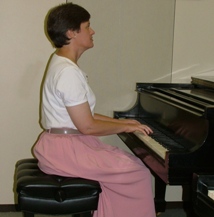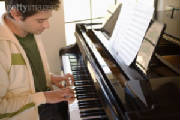Why Study Piano as an Adult.
Marcy works with many adults. Many are seeking a
new hobby, some are looking for a stress relief, some have partial or permanent disabilities, such as fibromyaliga and other
painful ailments. Many want to be able to play for friends or at dinner parties. Adult students range from low 20's to mid
80's. Marcy customizes the lesson based on the adults goals, and style of music they are interested in learning to play.
Adult students range from beginners, adults who played as a child and want to "re-learn",
advanced adults who want to improve their technique and repertoire.
Today, more and more adults are taking piano lessons. Many adult
piano students find that playing beautiful music relaxes them after a long day at work. Piano lessons are a wonderful
outlet for feelings, emotions and stress! Mastering each piece of music provides a great sense of value and enjoyment. Lessons
also improve one's discipline, focus and concentration. Adults are
also returning to piano lessons after taking them as children. Some adults may have had bad experiences or became too
busy with other activities and now realize the importance of music in their lives. Professional people have discovered that piano playing is one of the most relaxing things they can do after work.
It allows them to get their minds off the activities of the day and just focus on the pleasure of making their own music.
Some adults have even taken it a step further and become proficient enough to play at social events and parties. Re-learning
piano as an adult can be very rewarding. Not only will you improve your piano skills you will stimulate your brain. Adults
who take piano lessons often report a better ability to concentrate. Many also realize a greater aptitude for learning other
new skills. These things carry over into other parts of adult life, from work, to hobbies and even raising children.
Memory Enhancement
:Musical study can
play an important role in helping seniors keep a sharp mind. Research has linked playing an instrument to the stimulation
of areas of the brain involved with memory, which may have implications in preventing Alzheimer’s disease and other
forms of dementia. For example, a 21-year study by the Albert Einstein College of Medicine in the Bronx followed 469 seniors between the ages of 75 and 85 who did not have dementia at beginning of the study.
The results, which were published in the New England Journal of Medicine in 2003, demonstrated a strong association between cognitively challenging leisure
activities, including playing a musical instrument, and a decreased risk of developing dementia. Another study, conducted in an Illinois retirement home, revealed that seniors, ranging in age from their late 70s to early 90s, saw a 50
to 70% improvement in their memory after just 16 weeks of learning a new musical instrument. It is believed that the processes
involved in playing a musical instrument may provide the cognitive exercise the brain needs to protect itself against memory
loss. Physical Benefits Physical health and playing an instrument also seem to go hand in hand. Research by Dr. Frank Wilson
of the University Of California School Of Medicine in San Francisco found that learning to play a musical instrument, besides
bettering concentration and memory, also enhanced physical abilities such as coordination and even the improvement of eyesight
and hearing. Another study, the Music Making and Wellness Project, documented that seniors given keyboard lessons had a 90
percent increase in their levels of human growth hormone (hGH), a chemical important in slowing such aging factors as osteoporosis,
wrinkling and aches and pains.
Mental Health Benefits: Learning to play music can help seniors beat the blues,
too. The Music Making and Wellness Project also discovered that the seniors who learned to play the keyboard reported decreased
depression, lessened anxiety and lowered loneliness levels. In 2005, a research study led by Dr. Barry Bittman found that
playing a musical instrument reduced stress more than other relaxing activities such as reading the newspaper. Other Advantages of Musical Studies by Seniors Learning music can help with memory retention, and adds to your physical and emotional well-being, but
learning an instrument in your senior years has other pluses as well. These include allowing you to express yourself spiritually
and creatively, and even introducing you to new friendships as you pursue your love of music. Finally, but perhaps most importantly,
you can enrich the lives of your grandchildren and others around you through the gift of music.


